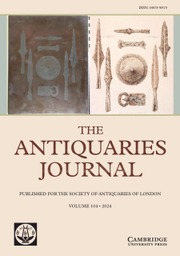No CrossRef data available.
Article contents
Anniversary Address
Published online by Cambridge University Press: 29 November 2011
Extract
As a President wanders in the rooms of the Society of Antiquaries, ever and anon he is confronted by the vision of his predecessors—sometimes singly, sometimes in formation; and for myself I cannot escape the feeling of bewilderment as to how I come to be in such company; and with it goes that exquisite sensation of inadequacy mingling with vainglory on which several of my predecessors have commented at their first entering in—and above all the rich sense of gratitude and appreciation for an honour scarcely earned but deeply felt. In particular, an incoming President cannot escape the amiable eye of his predecessor Jeremiah Milles—familiar to all of us from his portrait in the Meeting Room and his bust in the Library; and in the year now past he has been in a quite special way in our thoughts. It was just over two hundred years ago under his Presidency that the Society acquired one of the most valuable of its privileges or assets, if so we may term it: its rooms in Somerset House. This was the result of a pincer movement by ourselves and the Royal Society. Dr. Milles was a Fellow of both, as were many of the leading Antiquaries of the eighteenth century. He was an able, learned antiquarian and a Doctor of Divinity, who rose to be Dean of Exeter and to contribute to the study of the antiquities of Devon. He was a bon vivant who founded the first of our dining clubs. If he had been less of an antiquarian and more of a politician, no doubt he would have become a bishop; and very likely he would have been quite forgotten. But he was diplomat enough to know how this Society should secure free rooms in the new Somerset House. On 29th February 1776, after months or years of anxious intrigue, Lord North, the Prime Minister, was elected to our Fellowship, and agreed to carry to His Majesty King George III a petition for the rooms; on 19th March Lord North came to announce His Majesty's consent. In 1781 we entered possession; and a little under a hundred years later graciously consented to withdraw from Somerset House on condition that we were provided with adequate new accommodation on the site where we still meet.
- Type
- Research Article
- Information
- Copyright
- Copyright © The Society of Antiquaries of London 1982
References
NOTES
1 See 27th Annual Report of the Ancient Monuments Board for England (1980) (1981), esp. see s. 3. 2–5 (the Report has on its cover a fine aerial view from the Cambridge collection of Fountains in its parkland setting).
2 Evans, Joan, A History of the Society of Antiquaries (Oxford, 1956), p. 251.Google Scholar
3 See Archaeologia, civ (1973), 261–305.
4 See Barlow, F., Biddle, M., van Feilitzen, O. and Keene, D. J., Winchester in the Early Middle Ages (= Winchester Studies, ed. Biddle, M., i, Oxford, 1976), pp. 1–4Google Scholar (F. Barlow); see Ibid. for edition and commentary, esp. pp. 526–40 on the binding (H. M. Nixon).
5 See R. B. and C. Brooke, Popular Religion 1000–1300 (forthcoming); Poeschel, E., Die Kunstdenkmäler des Kantons Graubunden, vi (1945), PP. 20–5; Willy Zeller, Kunst und Kultur in Graubunden (Bern, n.d.), p. 224. I owe my knowledge of San Romerio, and these references, to the kind hospitality and help of Frau B. HesseGoogle Scholar




